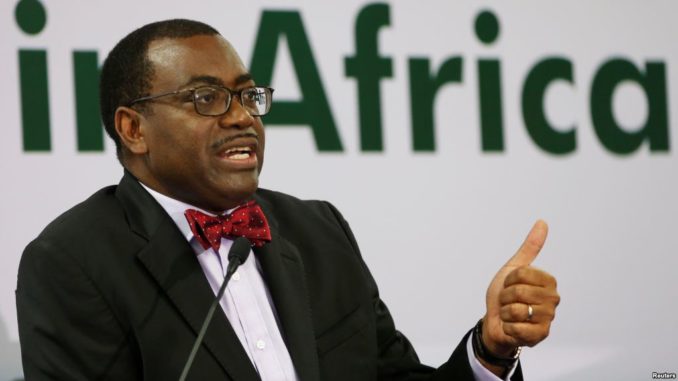
ROME —
Making agriculture profitable and “cool” for young people in Africa is key to lifting millions out of poverty and stemming migration to Europe, said the president of the African Development Bank (AfDB).
Akinwumi Adesina was named the winner of this year’s World Food Prize on Monday for his decades-long work to boost food production in his native Nigeria, increase access to credit for small farmers across Africa and transform the continent’s agriculture.
Kenneth Quinn, president of the Des Moines, Iowa-based World Food Prize Foundation, said the $250,000 award reflected Adesina’s “breakthrough achievements” as Nigeria’s minister of agriculture and his critical role in the development of the nonprofit Alliance for a Green Revolution in Africa.
Adesina, 57, told Reuters he was humbled by the award but felt his work to ensure Africa could feed itself was “uncompleted business.”
Almost 30 percent of the 795 million people in the world who do not have enough to eat are in Africa, according to the U.N. Food and Agriculture Organization.
“When I look at Africa today, I see that many rural areas unfortunately have become zones of economic misery,” Adesina said in a phone interview ahead of the award’s announcement.
No sector has greater potential to revive those areas than agriculture, but investments are needed to make it attractive for young people, many of whom risk their lives migrating in search of better opportunities in Europe, Adesina said.
“We must make agriculture cool for young people,” he said. “The key is to make agriculture a business. Agriculture is not a way of life, is not a development activity, it’s a business.”
Africa has 65 percent of the world’s uncultivated arable land but imports food for $35 billion every year, a bill that is expected to swell to $110 billion by 2025, he said.
“It makes no sense. That is food Africa should be producing, processing, selling and exporting,” he said. “Africa in the future should not only feed itself, but it must contribute to feeding the world.”
Toward this end, agriculture must become more industrialized, with farmers gaining better access to seeds, fertilizer, credit, power and infrastructure, he said.
Farmers should be supported to transform from producers of raw materials, such as cocoa and cotton, to manufacturers of finished goods such as chocolate and garments, which have less volatile prices, Adesina said.
To accelerate growth, the AfDB aimed to invest $12 billion in the energy sector, hoping to leverage another $50 billion from the private sector, he said.
Last year, AfDB had invested $800 million to support young agro-entrepreneurs in eight countries and planned to extend the scheme to 30 nations, he added.
Adesina called on governments and institutional investors, such as pension and insurance funds, to “see the gold” in African agriculture and invest in it to unlock its potential. He said he was convinced the future billionaires of Africa would come from agriculture.
“I don’t believe that the future of African youth lies at the bottom of the Mediterranean Sea,” he said. “The future of African young people lies in a more prosperous and inclusive Africa, and there is no other sector that has greater power to create growth than the agricultural sector.”
Adesina was named winner of the World Food Prize, regarded as the equivalent of a Nobel Prize for agriculture, in a ceremony on Monday at the U.S. Department of Agriculture in Washington.
VOA